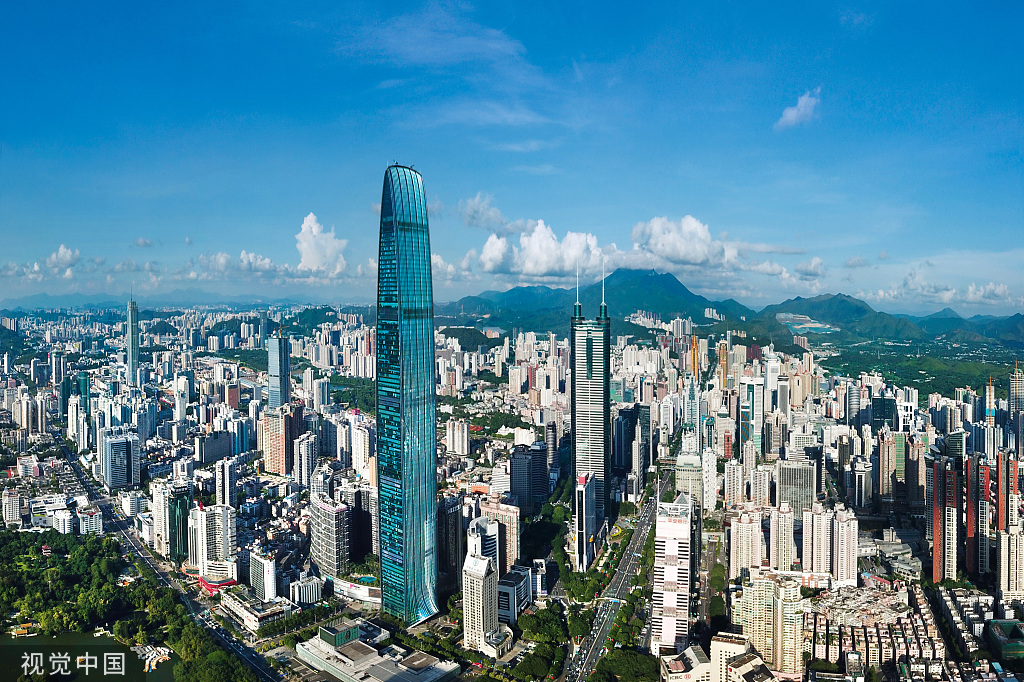Shenzhen: From fishing village to global benchmark city
- By He Shuquan
 0 Comment(s)
0 Comment(s) Print
Print E-mail China.org.cn, August 24, 2019
E-mail China.org.cn, August 24, 2019

On August 18, China unveiled a detailed plan of reforms to be implemented in Shenzhen, supporting it in establishing a model area of socialism with Chinese characteristics.
This sets a three-phase goal for Shenzhen: becoming a modern international city of innovation by 2025; a hub of innovation, creativity, and entrepreneurship by 2035; and a global benchmark city with outstanding competitiveness, innovative capacity and influence by the mid-21st century.
To achieve these goals, Shenzhen will take the lead in building a modern economic system of high quality development, establishing an environment of democracy and rule of law featuring fairness and justice, shaping a modern urban civilization of prospering socialist culture, forming a common development pattern of co-construction and common prosperity, and creating a beautiful Chinese model of harmony between humanity and nature.
Shenzhen is a place that truly reflects the progress made under China's reform and opening-up program. Before 1979, it was a tiny border fishing village with a small population, and serving merely as a customs stop into the mainland from Hong Kong.
However, in 1980, it was designated as one of China's first Special Economic Zones, serving as a pioneer for the country's subsequent reform, opening up and contemporary re-development. The city was opened to foreign investment, technology, and managerial expertise through the establishment of foreign-owned, joint-venture, and other business enterprises without the prior approval of the central government.
As tremendous amount of capital and human resources was attracted to the city, it grew rapidly in economic and social development, which has become known as the "Shenzhen speed." By the end of 2018, it covered an area of 1,992 square kilometers with a permanent population of 13 million.

From the 1980s, Shenzhen has always been in the forefront of reform and open-up in China's mainland. Among others, the China (Guangdong) Pilot Free Trade Zone launched in 2015 and the Guangdong-Hong Kong-Macao Greater Bay Area initiated in 2017 are two major projects in which it is playing a key role.
The Guangdong FTZ is designed to embrace both Hong Kong and Macao to promote further opening up of the mainland to the world. Efforts will be made to create a joint cooperation demonstration zone, with an international, market-oriented and regulated business environment based on pilot reforms.
On this basis, it is expected to establish a new and open economic system, with new advantages in terms of international economic competition, set up a free trade park with a regulated environment meeting the highest international standards, and offer investment and trade facilitation, outstanding leadership functions, and safe and highly efficient supervision.
The Greater Bay Area is the latest attempt to break new ground in pursuing all-round opening up, and taking a further step in the practice of "one country, two systems" policy, with an aim to develop an international innovation and technology hub, build a globally competitive modern industrial system based on ecological conservation, and etc.
From the plans and goals that were a feature of the initial opening up in the late 1970s, to the recent model area plan, there is clear consistency in China's ambition to develop Shenzhen into a global benchmark city, a model area of socialism.
Building it into a model city will be conducive for better implementing the strategy of the Guangdong-Hong Kong-Macao Greater Bay Area and the Guangdong FTZ, with the key roles it will play in terms of international innovation and as a hub of high technology advancement.
He Shuquan is a professor from School of Economics, Shanghai University.
Opinion articles reflect the views of their authors only, not necessarily those of China.org.cn.
If you would like to contribute, please contact us at opinion@china.org.cn.






Go to Forum >>0 Comment(s)